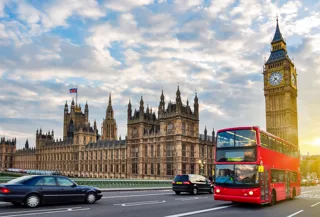Despite the Chancellor coming into this announcement with an upbeat attitude, a series of disparaging news stories at the start of this week, including the decline in consumer spending, cast an ominous shadow over proceedings.
The much downplayed Spring Statement was introduced to provide stability to consumers and businesses and to allow them to plan effectively for the future without having two major tax changes in the same year.
While this may be the case, the government still needed to offer clarity to help inform our spending.
Transport
Despite the Chancellor’s positive outlook and ‘balanced approach’, economic uncertainty persists. UK businesses need to remain mobile throughout this period and the need to keep labour and goods moving is constant.
It is worrying to see the funding gap in regional transport spending continuing. The Chancellor claimed the nation is undergoing the largest road building project since the 1970s, however, London currently receives five times the level of funding as Yorkshire and the Humber.
This balance needs to be addressed if the Northern Powerhouse movement is to achieve any success.
The two previous Budgets included plans for the growth of a national electric vehicle infrastructure and momentum needs to remain with this if we are to accelerate the uptake of EVs.
However, we welcome the consultation on lower VED rates for the cleanest vans.
Technology
Although the economy grew above forecasts at 1.7% in 2017, since the Brexit referendum, the country’s growth has gone from being the top performer to the worst of any G7 nation.
Despite this, there was a clear nod towards technology with the Chancellor heralding the nation at the “vanguard of technological revolution.”
We must continue seeking investment in this sector to support new tech businesses, one of which is founded every hour in this country. As a developer of innovative technologies, we see this as paramount to the future lifeblood of the economy.
Apprenticeships
Around 15% of Nexus’ workforce is made up of current and former apprentices and we recognise the huge contribution they can make if given the opportunity.
We therefore welcome the need to address the confusion created by the Apprenticeship Levy with the Chancellor releasing £80million of funding to help small businesses take on new apprentices.
This will hopefully go some way to hitting the target of 3million apprenticeship starts by 2020.
Fleets
Although the format has slimmed down from last year’s Budget, businesses across the country are seeking answers to a range of issues, which the Spring Statement fails to reference.
Fleets are still seeking the clarification of Company Car Tax (CCT) rates for 2021-22 and 2022-23.
Many fleets will be entering contracts that stretch into these years and urgent clarification is needed to define these rates, which will affect fleet decision making and purchasing.
In the meantime, this may create opportunities for the rental sector with medium and long-term rental now seen as an attractive stopgap.
Another area fleets are still seeking clarity on is the HGV Road User Levy. Despite the consultation period ending in January, fleets are still in the dark regarding what will change.
The proposed scheme to adopt a national pay-per-mile system to alleviate congestion and cover road repairs would punish hauliers, who are the backbone of our economy, and sets a dangerous precedence for all drivers.
Mobility providers all across the country are seeking the results of this consultation as a matter of urgency.
By David Brennan chief executive officer for Nexus Vehicle Rental

















Login to comment
Comments
No comments have been made yet.